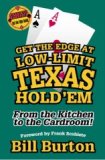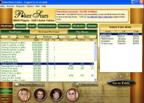
Get the Edge at Low Limit Texas Hold'em
How to Play Seven Card Stud
Until a few years ago, Seven Card Stud was the most popular poker game in the cardroom. Everyone who has ever played poker at home is familiar with seven card stud because most of the crazy home
Seven Card Stud has five betting rounds instead of the four found in Hold'em and Omaha. There are also two betting variations you may encounter depending on the limits you want to play. In the higher limits, the first two betting rounds are one amount and the limits double on the last three rounds.
For instance in a $5/10 game the first two rounds are five dollars and the last three are ten dollars. In the lower limit games the betting levels are usually a spread amount. One of the most popular spreads for low limit games are $1-5. This means that a player can bet any amount with in that spread.
A player can bet any amount with $1 being the minimum bet and $5 being the maximum bet. If a player wants to raise he must double the amount of the bet.
Seven Card Stud is an ante game. That means that each player must put some money in the pot before the game begins. The amount of the ante depends on the limit of the game and also may vary from card room to card room. Some cardrooms offer low limit spread games with no antes.
After the antes are put in the dealer scoops the money into the pot. Each player is dealt two cards down and one card up beginning with the player to the immediate left of the dealer button. The two face down cards are called your hole cards and the up card is referred to as your "door card."
The first betting round is called Third Street because you have received three cards to begin the hand. After the cards are dealt the first betting round begins. In the first betting round the player with the lowest card showing is required to make a forced bet know as the "Bring in" bet. The size of this bet is slightly larger than the ante but less than the minimum bet. In a $1-5 game it is usually around 75 cents.
After the bet is made the next player on the immediate left of the player making the bring in bet has the option of calling the bet, folding, or raising. During this first round if a player wishes to raise the amount of the raise is not double but equal to the amount of the minimum bet for that game. In a $1-5 it must be at least one dollar but no more that $5. In a $5/10 game the raise would be $5.
After the betting is finished each player is dealt a second card face up and the second betting round begins. From this point on the action starts with the player showing the highest and at the beginning each of the remaining betting rounds. The player with the highest hand is not forced to bet. He can check and the player to his left then has the option of betting or checking. If there is a bet and a player acting after the bet must call, fold or raise. A raise would be double the bet in a spread game or the higher denomination in a fixed betting game.
When betting is for that round is complete each active player is then dealt a third card face up. In a limit game the betting is now higher bet, So in a $5/10 game all the bets are now in multiples of $10. The player with the highest hand showing acts first and can bet of check. The betting proceeds clockwise.
A fourth card is dealt face up to all active players and there is another betting round with player showing the highest hand acting first.

